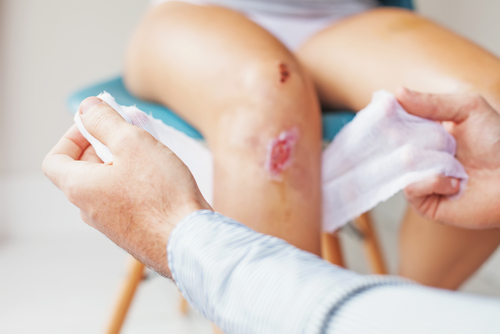Voxelotor May Reduce Severity and Number of Leg Ulcers, Trial Analysis Suggests
Written by |

Voxelotor can reduce the severity of existing leg ulcers and the incidence of new ones in people with sickle cell disease (SCD), new clinical trial results suggest.
The findings detailed by the treatment’s developer, Global Blood Therapeutics (GBT), are being presented at the 13th Annual Academy for Sickle Cell and Thalassemia Conference, held this week in London.
Voxelotor (previously GBT440) is an investigational oral therapy that increases the affinity of hemoglobin for oxygen, ultimately blocking red cell destruction. It is currently under priority review by the United States Food and Drug Administration, which will make its decision on whether to approve Voxelotor by Feb. 26, 2020.
GBT’s recent results come from a post-hoc analysis (an analysis done after the completion of a trial) of the Phase 3 HOPE clinical trial (NCT03036813). In this trial, SCD patients 12 and older were treated daily with either a placebo or one of two doses of voxelotor (900 or 1500 mg), for 24 weeks. Previously published results of this trial suggested that the active treatment increased hemoglobin levels while decreasing markers of red blood cell damage.
The new exploratory analysis focused specifically on trial participants who had leg ulcers, including those that developed before the start of the trial (in 13 people) and while it was ongoing (four people). Leg ulcers are estimated to affect about a quarter of the people with SCD, and to date, no therapy has been shown to treat them in clinical trials.
Of the participants with leg ulcers, four were on the higher dose of voxelotor (1500 mg/day). In three of these participants, ulcers resolved completely; in the fourth, there was mild-moderate improvement. No participants on this highest dose developed new leg ulcers during the trial.
Of the six participants with leg ulcers who were on the lower voxelotor dose (900 mg/day), three had their ulcers resolved, one had mild-moderate improvement, and two experienced no improvement. Two participants on the lower dose developed ulcers over the course of the study.
Of the three participants with leg ulcers taking the placebo, none saw an improvement in ulcer severity, and two individuals on the placebo developed ulcers over the course of the study.
Additionally, resolution of leg ulcers was associated with a higher percentage of hemoglobin molecules carrying oxygen in the participants’ blood (hemoglobin occupancy of 20% or more).
“We are encouraged by the results of this analysis of an exploratory endpoint of the HOPE Study because they not only suggest potential clinical benefit of voxelotor in leg ulcers, a serious complication of SCD, but they are also consistent with our understanding of how the improvement in anemia and hemolysis with voxelotor can potentially translate to an improvement in related clinical morbidity,” Josh Lehrer, MD, chief medical officer at GBT, said in a news release.
Lehrer noted that additional post-hoc analyses of the trial results are planned.





